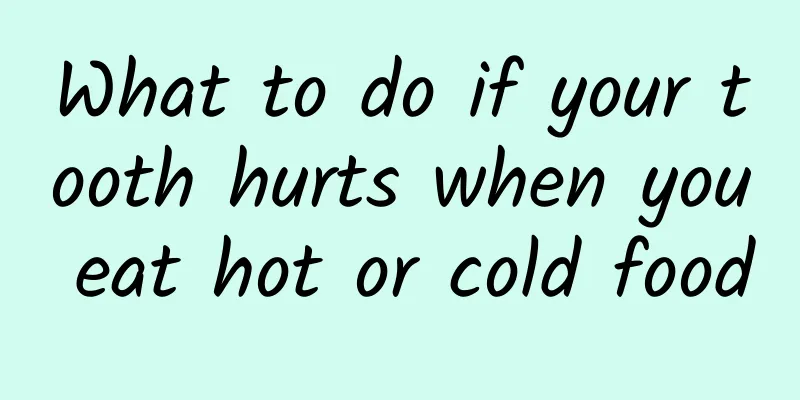What to do if your tooth hurts when you eat hot or cold food

|
I remember there was a toothpaste advertisement that said it was cold, sour and sweet, and you could eat it whenever you wanted. At first I didn’t understand the meaning of this advertisement, but later I found out that many people couldn’t eat cold, sour, or sweet foods because of toothache, and they couldn’t even eat the most basic rice. I suddenly realized the meaning of this advertisement. Medical personnel say that toothache caused by eating hot or cold food may be due to tooth sensitivity. So what should you do if your tooth hurts when you eat hot or cold food? If you've ever felt an electric tingling sensation in one or more teeth that made you uneasy when you took a sip of iced tea, chewed a candy bar, or sipped a cup of hot soup, you have "tooth sensitivity" - a euphemism for a very uncomfortable condition. When should you see a dentist for tooth sensitivity? You can treat common tooth sensitivity on your own, but you should consult a dentist if the following situations occur: Your teeth are always sensitive to pressure. If a tooth is constantly sensitive, it may mean that the pulp is infected or necrotic. After using desensitizing toothpaste for two weeks, the allergy did not improve. The toothache lasts for more than an hour. Changes in gum color around sensitive teeth. There is obvious caries. What's going on? Why do your teeth react to cold, heat, acid, sweet, and sometimes even pressure? Your dentist will perform tests to determine the cause of your discomfort, as there are many reasons for tooth sensitivity, such as trauma or dental disease, which can cause damage to the dental pulp. This may require root canal treatment to relieve the pain. One or more teeth may become sensitive to minor pressure due to a "bruise" or other injury - for example, accidentally chewing a popcorn kernel. Tooth sensitivity often occurs after a cleaning, filling, or while being treated at the dentist's office. Sometimes, it takes weeks or even months for this allergy to subside. Others may develop tooth sensitivity due to habitual teeth grinding or clenching of the upper and lower jaws too tightly. If this allergy only happens once or twice and goes away after a day or two, there is no need to worry. The teeth just take a while to heal. If sensitivity to pressure persists, it is necessary to suspect a cracked tooth or decay and consult a dentist. Temperature sensitivity often means that the tooth is damaged in some way. Sometimes this means that the teeth were knocked around too quickly or too hard because the teeth shifted slightly and the way the tooth surfaces touch each other during chewing changed. These changes may occur due to habits such as thumb sucking or changes in the bone structure of the teeth. If your sensitivity is simply due to worn tooth enamel or receding gums, try the following tips to relieve your symptoms. Use a desensitizing toothpaste. Unfortunately, extensive tooth sensitivity caused by enamel wear or gum recession cannot be cured with a dental filling. Try a desensitizing toothpaste, which is available without a prescription. These special toothpastes contain ingredients that fill the ducts (small tubes) in the dentin, thus eliminating sensitivity. Before going to bed at night, dip your finger or a cotton swab in some toothpaste and apply it to the sensitive teeth. Spit it out, but don't rinse your mouth. After a few weeks, tooth sensitivity should improve. Use a fluoride mouthwash. Fluoride mouthwash, available without a prescription at your local pharmacy or over the dental counter at a store, can help relieve sensitivity, especially for those suffering from tooth decay. Use once daily. Swish it in your mouth a few times, then spit it out. Sometimes, patients with tooth sensitivity need a mouthwash or gel that contains more fluoride than is available in over-the-counter products. For example, some treatments for gum disease, such as root planing (which reduces plaque), can make already sensitive teeth even more sensitive. In this case, your dentist may use fluoride gel to help relieve symptoms. Keep your teeth clean. Plaque is the white, gelatinous substance on teeth that produces acid that irritates the teeth, especially if they are naturally sensitive. Fight plaque by brushing your teeth at least twice a day, preferably after meals or before bed, and flossing at least once a day. Use a soft-bristled toothbrush. Often, people damage the protective enamel by brushing too hard or using a hard-bristled toothbrush. As gums recede (often an inevitable part of aging), exposed dentin becomes more susceptible to abrasion from a toothbrush. Try to use a soft-bristled toothbrush and don't brush too hard (in fact, brushing more gently will allow the toothbrush to move more freely and achieve better brushing results). |
<<: Where should I use moxibustion for toothache?
>>: Why does my toothache last for a month and still hurt?
Recommend
The best way to treat frequent urination in women
Frequent urination is something that everyone is ...
Can cervical erosion be cured?
Speaking of cervical erosion, it is indeed a gyne...
How to determine bone closure?
People with tall stature generally have an enviab...
What are the dangers of gas eggs?
Balloons are actually hernias. Hernia refers to t...
What are some detoxifying and beauty teas? Don't say you don't know anything.
In fact, if you want to beautify and maintain you...
Detoxification and Blood Activating Paste for Eczema
All medicines have side effects and some adverse ...
What to do if you forget
Forgetfulness is a big taboo for many people. For...
What to do if your throat is itchy and you have a dry cough
In daily life, we also need to protect ourselves ...
Headache throbbing pain
There are many causes of headaches, but few peopl...
What are the symptoms of lumbar stones?
In daily life, waist stones are a very common dis...
Adenoids hypertrophy ablation
The human body is a large entity composed of vari...
Eczema on the penis
Eczema on the penis may be a symptom of genital w...
How to push during a normal birth
Many married female friends who have never given ...
What medicine should I take for shoulder pain
Shoulder pain is a very common condition in daily...
How to clean the intestines after overeating, there are methods to cleanse the intestines and detoxify
People often experience symptoms of gastrointesti...









